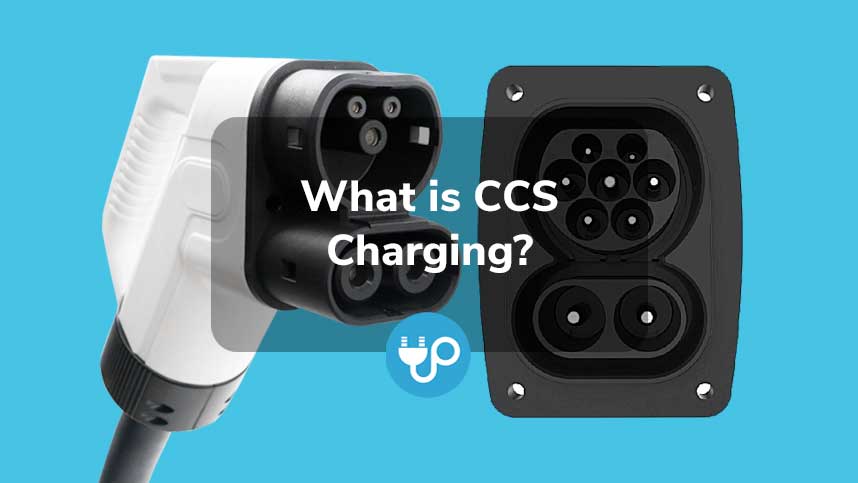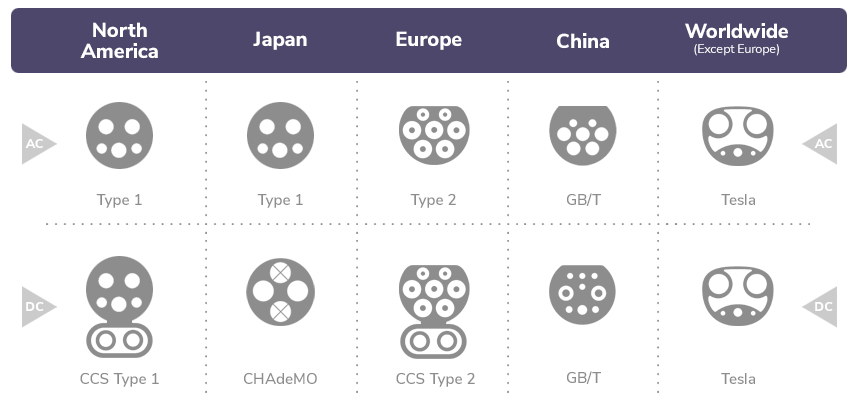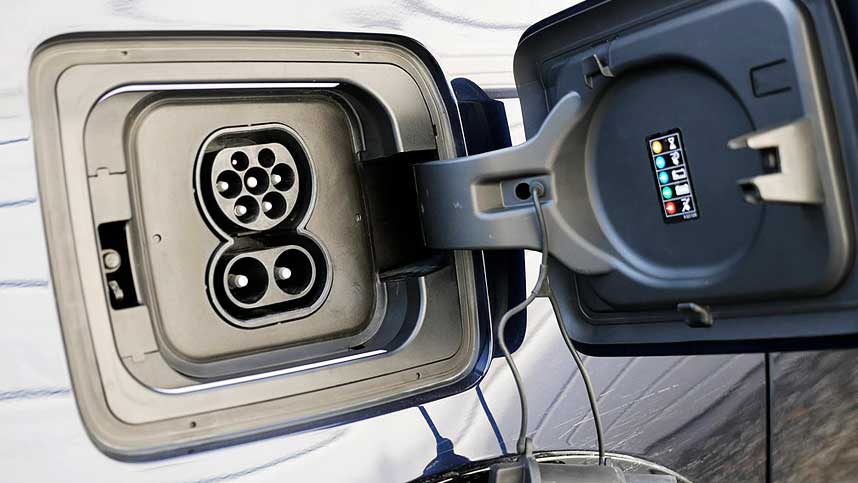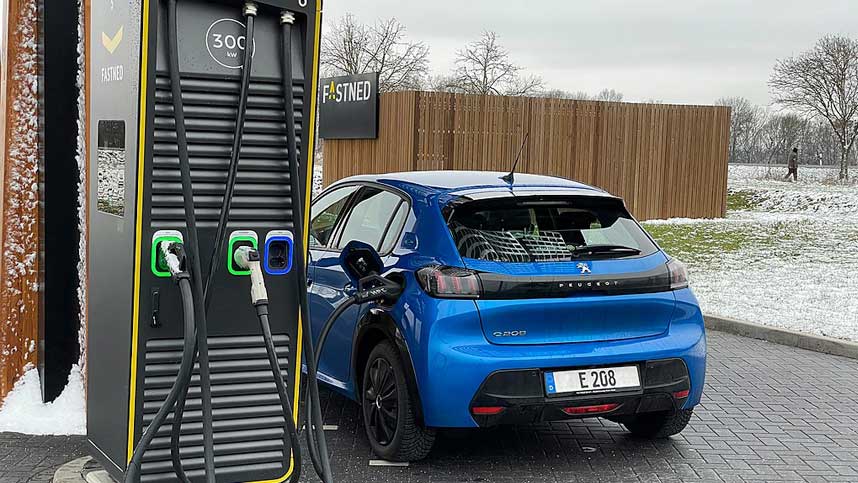
What is CCS Charging?
CCS charging stands for Combined Charging System.
Combined Charging Systems are two types of electric car plugs combined into one.
It’s a five-prong system, capable of Type 2 charging via a higher voltage DC (direct current) electrical feed.
CCS charging has become more widespread in the EV world due to its speed, with most modern manufactured vehicles being able to accept Type 2 DC charging.
Knowing what type of socket your electric vehicle has and which types of electric car plugs charging stations offer can help save a lot of charging time and hassle.
This article goes into greater details about CCS charging, including pros and cons.
Chapters
What does CCS mean?

CCS is short for Combined Charging System.
It’s essentially a type of electric vehicle charging socket with two integrated charging systems in one.
They being - most commonly Type 2 sockets and DC fast chargers.
CCS charging is becoming more commonplace at public charging stations and on newer vehicles due to its versatility and charging speed.
Most new electric cars accept CCS plugs, although some vehicles can only accept a certain kWh rate dependent on their battery.
Some older vehicles such as the early Nissan Leaf and Tesla Model S for example, cannot use CCS charging at all.
Their batteries are simply unable to accept a direct current that strong.
Any attempts to do so would fry their batteries in seconds.
More modern electric cars, however, accept CCS charging using the combined Type 2 and DC connectors.
It’s not common to find CCS charging systems in residential settings simply because home electrics are single phase AC (alternating current).
The amount of energy supply required to be able to provide some of the higher rate currents CCS uses is simply too much for any home to be able to cope with.
Therefore, CCS charging will only ever be found at charging hubs owned and run by major energy suppliers.
As briefly mentioned above, the maximum current an electric car can accept dictates the charging rate that can be used, and not the maximum output the rapid charger delivers.
But with more and more electric vehicles being fitted with batteries capable of accepting high kilowatt output DC charging, CCS is becoming more widely used.
As a result, more charging hubs with CCS chargers are beginning to be rolled out across the country.
Who can use a CCS charger?

A driver’s ability to use a CCS charger depends on the specification of their car, most importantly the battery.
Currently, CCS charging plugs are not universally compatible with every make and model of electric vehicle.
More modern EV models such as the BMW i-3, Kia E-Niro, Jaguar i-Pace, VW E-Golf, and Tesla Model 3 however, are capable of using CCS plugs at rapid charging stations.
Vehicles such as the Tesla Model 3 can use both Tesla Superchargers and CCS charging stations.
This was a capability that Tesla integrated since the launch of that model.
In terms of accessibility, CCS charging stations are pretty much commonplace on all major motorways and service stations.
However, the vehicle owner’s car must have the correct type of socket and battery in order to accept CCS rapid charging.
Home CCS charging units are available but are not very commonplace.
Tesla home chargers or Type 1/Type 2 chargers are far more common.
Presently, most households usually own just one electric car if any at all, with around 2% of vehicles on the UK’s roads being fully electric.
So a CCS charger is unnecessary if overnight fast charging using a 7kW charger is possible.
Advantages of CCS charging

CCS chargers are not currently the dominant charger type across the UK or continental Europe.
However, they have advantages over traditional single-plug car chargers.
CCS combines Type 2 charging and DC fast charging into one simple five-pronged plug.
Standard Type 2 home chargers deliver current at a slower rate, usually 7kW, whilst DC fast chargers deliver a current much more rapidly, up to a staggering 350kWh!
A CCS-equipped electric car is capable of charging at either a Type 2 compatible station or a DC fast charger, providing greater flexibility for drivers.
CCS-compatible electric vehicle owners therefore suffer far less of the dreaded “range anxiety” due to having a wider variety of community charging options.
By having a vehicle equipped with CCS charging capability, it offers greater flexibility, thus adding resale value to the car.
CCS rapid charging stations are growing in numbers, making them a crucial part of the transition to electrified roads.
As more and more are built, the less range issues will become.
Disadvantages of CCS charging
While CCS charging has many positives, it’s not all good news.
Whilst rapid charging does offer many conveniences, most notably time and speed, consistent use of rapid CCS charging reduces battery life.
Electric vehicle battery technology still has some way to go, and with the current crop of vehicles, battery technology is improving but they still have their flaws.
For instance, the batteries may be capable of generating more power thus longer ranges, yet too much rapid charging can cause overheating of battery cells, which will permanently damage them.
In truth, fast charging at slower rates using AC is the safest way to top up EV batteries.
CCS charging is fast and convenient, but with too much overuse could come at the cost of damaging your vehicle's batteries, and ultimately its range capacity.
According to research, one year of standard AC Type 2 charging decreases battery life by 23% compared to 27% using DC fast charging.
Conclusion
All things considered, CCS charging offers a lot of positives in the world of electric vehicles.
Increased accessibility, plus the speed and convenience of CCS charging will undoubtedly boost EV uptake.
Unfortunately, CCS is only integrated with the more recently introduced Type 2 socket, so owners of older pre-2013 electric vehicles using Type 1 plugs will sadly miss out.
However, CCS is great news for anyone purchasing a brand new EV.
It means motorists can continue to drive long distances with confidence, and put that range anxiety demon to bed once and for all.
Blog Archive
- Electric Car Tyres – All You Need to Know
- Are Electric Cars Cheaper to Run?
- Do Electric Cars Use Oil?
- 70% of UK Councils Have No On-Street EV Charging Plans
- Joosup + waEV-Charge: Electrifying the Future Together!
- What is an EV Battery Lease?
- 8 Great Reasons to Share Your EV Charger
- What is OZEV?
- What is ULEZ Compliant?
- Electric Car Charging at Home with No Driveway – What Can You Do?
- EV Home Charger Installation for Beginners
- How to Drive an Electric Car
- What is Range Anxiety & How Do We Defeat It?
- What is Destination Charging?
- What is a CHAdeMO Charger?
- What is CCS Charging?
- What is Peer to Peer EV Charger Sharing?
- Types of Electric Car Plugs Explained
- What is Community Charging?
- How Long Does It Take to Charge an Electric Car?

